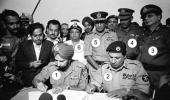Asim Munir and his brand of short-sighted Pakistan army officers give no inkling of paying heed, changing course or learning lessons from the past, observes Rana Banerji, who headed the Pakistan desk at RA&W.

Pakistan army chief General Asim Munir's speech at the Overseas Pakistani Convention in Islamabad on April 16, where he harked back to Pakistan's creation on the basis of the 'two-nation' theory and re-iterated the oft-touted stance of former Pakistani politicians and generals about Kashmir being Pakistan's 'jugular vein', only revealed that senior Pakistani generals continue to remain mired in a narrow, India-centric time warp of unrelenting hostility, in which they continue to cite 'Indian machinations' as the cause of all their woes.
This approach is completely lacking in strategic vision, especially in the context of tackling resurgent terrorist forces through an alternate or additional path of compassion, dialogue, reconciliation and inclusive development.
Ever since Munir came to the helm of Pakistan's army in November 2022 in what some Pakistani military analysts may contend were rather controversial circumstances extending his date of retirement, he has had to struggle to assert his authority both over peer officers and the political Opposition which had been galvanised by ousted prime minister Imran Khan.
Not only was he from the 'secondary' Officers Training Scheme' against 'regular' Pakistan Military Academy, Kakul recruits, here was a former protégé propped up by the military to displace the Sharifs referring openly to the hallowed military leaders as 'Mir Jafars', or 'neutrals like animals'.
The May 9, 2023 attack by irate masses on the Lahore corps commander's Jinnah House as well as at other locations like the army headquarters, Rawalpindi and several 'martyrs' memorials' all over the country was unprecedented and saw the army chief scraping the barrel to select and post a new corps commander to IV Corps, Lahore.
Since then, as happens with any other army chief in Pakistan, Munir was able to gradually assert his authority by bringing in his own loyalists like Lieutenant General Shahid Imtiaz (also from the officers training scheme stream) in crucial command slots like the X Corps, Rawalpindi, extending tenure of the then serving director-general, Inter Services Intelligence (ISI) Lieutenant General Nadeem Anjum and thereafter, bringing in Lieutenant General Mohd Asim Malik, son of a former general and 'sword of honour' holder at the 80th PMA long course as his new DG, ISI.
He held several meetings at Lahore garrison and elsewhere to appease/neutralise a section of retired generals like Amjad Shoaib and Naeem Lodhi who were advocating an olive branch to Imran.
However, despite efforts to manage the February 2024 general election and purge the higher judiciary perceived to be partial to Imran, the impression persisted that Munir was not working from a position of strength and had failed to erode the narrative of victimisation or persecution projected so successfully by Imran Khan, with the general masses feeling for the first time perhaps that the army as an institution was failing Pakistan.
The emerging middle class youth especially seemed demoralised and there has been talk of a sustained 'brain drain', with opportunities being sought, through illegal traffickers too, to leave for Europe.
Against this backdrop, the resurgence of terror both in Khyber Pakhtunkhwa (Tehrik e Taliban-led) and Baluchistan (Baluchistan Liberation Army-led), extending also to attacks on Chinese technical personnel deployed on CPEC projects created additional pressure, culminating in the Jaffer Express train hijacking on March 11, 2025.
Speaking at the in-camera national security briefing in the national assembly on March 18, Munir first spoke about the need to emerge as 'a hard State', where every institution of government would have to scrupulously follow the rule of law to provide effective governance.
Otherwise, the army could not keep on taking casualties indefinitely.
Formation of a new 'National Intelligence Fusion and Threat Assessment Centre' has been announced, to better co-ordinate work of intelligence agencies.
Recent visits by a section of overseas Pakistanis provided an opportunity to the army leadership to create divisions within the pro-Imran Pakistani diaspora based in the USA on the issue of Imran Khan's possible early release from prison.
The message also went out to Pakistan Tehrik e Insaf politicians, an already divided lot, that no such deal was in the offing, under possible US pressure.
A US lawmakers' delegation also visited Islamabad and met the army leadership separately (April 12-13, 2025).
With the IMF agreeing recently to continue the extended funding agreement and the army touting its stewardship of the Special Investment Facilitation Council, the two-day international minerals convention at Islamabad (April 8-9) offered another occasion to suggest that Pakistan was poised to move out of the woods!
At the Overseas Pakistanis Convention which followed (Islamabad, April 13-16) the entire federal government machinery was spurred into action to present a grand event.
Both Prime Minister Shahbaz Sharif and Munir gave long speeches.
It is here that Munir seems to have take it on himself to deliberately project a position of a strong leader, standing firm on well learned edicts of Islam, giving a message of resilience and hope, also intended for disgruntled youth and leaving no doubt as to who was in charge. He talked of crushing terrorism with a strong hand.
Asim Munir's 'hard talk' notwithstanding, perceptive political commentators in Pakistan (Dawn: Zahid Hussain and former diplomat Ashraf Jahangir Qazi) have not been reassured.
They keep reminding the military that absence of 'a clear policy to win the trust of the people beyond the use of coercive power' which 'neither represents the interest of the people nor works for their welfare' reveals 'a colonial mindset', leaves little 'time to pull back from the brink and save the federation'.
Qazi entreats,'What is absolutely required is a Nelson Mandela-like initiative to help heal the country and bring about a national reconciliation.
'The emphasis would be on putting our tragic past behind us and holding people accountable, but not on prosecuting responsible individuals for their past crimes.'
Asim Munir and his brand of short-sighted army officers give no inkling of paying heed, changing course or learning lessons from the past.
Feature Presentation: Ashish Narsale/Rediff.com










